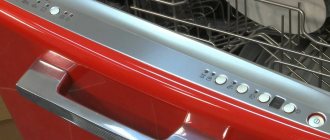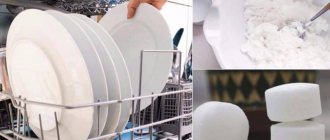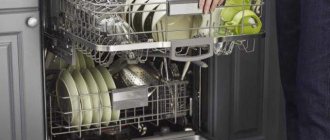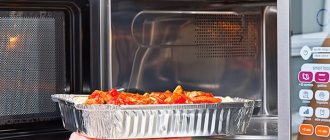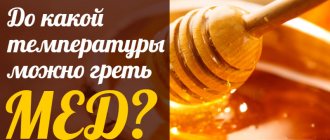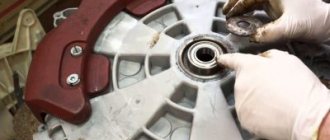When a dishwasher first appeared in my apartment, I thought - here it is, a lifesaver that will now clean the kitchen for me!
I think your first impression was about the same. And, like me, it was most likely followed by slight disappointment: a dishwasher is not a magical solution to all problems, it is just a tool. Which, like any other tool, has its limits and limitations. 10 easy recipes for dinners in 15 minutes Enter your email and get a recipe book - instantly and for free![/td]
Washing dishes has become faster, but loading and unloading the dishwasher still takes a lot of time. It is demanding on water quality. If it breaks, it is usually at the most inopportune moment. And the worst thing is that not all dishes can be washed in it!
You probably read in the instructions before using it for the first time about what types of dishes should never be put in the dishwasher, and you’ve probably already forgotten half of them. For this reason, I decided to translate an article I discovered on my favorite English-language website about what types of dishes should not be washed in the dishwasher. This article was written by Daniel Gritzer, a man with a thorough approach and good theoretical background, so you can rely on him. And don't be alarmed by how long this list is. After studying it, you can rest assured: all other dishes can be washed in the dishwasher!
So, here's what you can't put in the dishwasher:
What can be washed in PMM under certain conditions
There is a group of cutlery that can be washed in the dishwasher at a certain temperature by choosing the right product and location.
For example: Cupronickel is an alloy from which exquisite spoons and forks are made, reminiscent of silverware.
Cupronickel silver devices cannot be placed in a chamber with other metal objects, as this will cause them to oxidize and darken. If there are decorative elements made of other materials on the handles, it is better to wash the set by hand. Also carefully read the instructions for the detergent to see if it is compatible with cupronickel.
Porcelain is a delicate, delicate and expensive material. Manufacturers of Japanese and Chinese porcelain do not recommend machine washing, but experienced housewives have come up with a safe way to wash tableware in a PMM:
- Choose a temperature regime no higher than 55 degrees - high temperatures have a bad effect on porcelain.
- Do not use aggressive detergents.
- Use only the top of the basket for loading.
- Cups, saucers and other elements should not touch each other.
- Do not wash porcelain at the same time as other materials.
- Porcelain with gilding and glaze has no place in PMM.
By following these points, you can easily get a clean and intact set.
- Thermos. Dishwashing detergents, hot water, strong pressure can ruin a thermos, damaging the flask. Therefore, if you choose a low-temperature cycle, a delicate, liquid product, you can successfully wash a thermos or thermal mug.
- Toys for children. Many mothers use a dishwasher to wash and disinfect children's toys. You can wash toys made of durable, high-quality plastic, without small, detachable parts, rubber, silicone. It is not advisable to wash dolls with artificial hair - the hairstyle cannot be saved after such a “shower”.
- Zepter brand.
“Zepter” cookware is a popular, high-quality cookware equipped with high technology. Made from durable alloys and heat-resistant glass that can withstand dishwashing. But some technical elements (for example, a thermal controller on the lid) may be damaged during washing. Therefore, before loading into the hopper, such parts must be unscrewed.
Teflon frying pans, saucepans, saucepans. If we are talking about the original Teflon brand, then the manufacturer gives the go-ahead for automated care of Teflon products. But quite often sellers call any non-stick coating Teflon. Therefore, before loading dishes, read the instructions, look for permitting or prohibiting markings. If there is a “washable” icon, feel free to load the devices and start the cycle. The symbols on the dishes will help you determine the correct use, care, and storage.
- Knives. If the dishwasher is equipped with a special compartment for knives, they can be washed without problems. Otherwise, the sharp blades damage the metal of the grille, become dull, and the wooden handles deteriorate.
- Baking trays - can be washed in the lower compartment, if it is suitable in size, you must first remove burnt-on food debris and grease so that the pumps do not become clogged.
- Cast iron, cast iron grates. Cast iron products deteriorate from aggressive detergents, high temperatures, and prolonged exposure to water. Subject cast iron to this test as a last resort, choosing the shortest mode, low water temperature, without detergent. This also applies to grill grates, unless they are made of aluminum. Aluminum deteriorates in the machine.
- Filter jug. Jugs “Barrier”, “Aquaphor”, etc. can be washed in a PMM at a temperature of no more than 40 degrees.
- Hood filter. The choice of cleaning method depends on the material from which the hood mesh is made. If it is aluminum or an aluminum alloy, choose manual care, otherwise the filter will turn black and become deformed.
- Refrigerator shelves. Shelves made of thick plastic can be refreshed at low temperatures, without abrasive detergents - otherwise the material will be scratched.
- Plastic containers - if there is a sign allowing this method.
What's the benefit?
Many opponents of dishwashers believe that they require a lot of energy, water resources and detergents. At the same time, supporters of automatic home assistants in the house claim that the technology significantly saves not only the housewife’s time, but also her energy. In addition, the resources spent are not so great compared to manual washing of kitchen utensils. However, before purchasing, you need to make an informed decision. Some people believe that for a family of two there is no need to purchase PMM, while others say the opposite. In this case, the following arguments are given:
- During dinner, only two plates accumulate for the second course, a couple of salad bowls and glasses of coffee and tea. This set of dishes is easy to quickly wash with your own hands.
- However, dishwasher enthusiasts are making adjustments to this situation. In addition to plates and cups, it is necessary to add to the list the pots and pans in which the hostess cooked dinner. In addition, guests may come unexpectedly, so the volume of dishes increases significantly.
All mechanisms
Examples:
- pasta machines;
- meat grinders;
- hand chalks;
- pepper and spice mills;
- pressure cooker lids.
Causes:
One day, the Tin Woodman was caught in the rain and froze in place as his limbs instantly became covered with rust. It's a long story and it has many morals: we only have heart, brains and courage if we believe in ourselves; never lie; There's no place like home—but all of that is pretty trivial compared to the big lesson in this story: If you want your mechanical gizmos to keep working, don't put them in the dishwasher.
If it has gears, moving parts, handles or valves, wash it by hand according to the manufacturer's instructions.
What dishes can be washed in the dishwasher?
But not everything is so sad for the hostess. What dishes can be safely washed in the dishwasher:
Ceramic pieces of services (those without decorative inserts). If there is a design on a ceramic plate that was made by firing, then there is nothing to be afraid of, it will not peel off. But if the ornament is applied on top of a burnt surface, then it will peel off in the dishwasher. Food-grade plastic dishes, food containers, and silicone baking molds can be safely washed. They endure any test. A food container without a lid will clean well. Items made of ordinary glass can easily withstand automatic washing. Soviet “crystal” also easily withstands washing in the dishwasher
It is only important to ensure that objects do not touch, otherwise damage may occur. Cutlery made from stainless food steel can easily be washed. You can also wash cupronickel spoons and forks.
They can withstand both detergent and temperature. Porcelain without a pattern can be washed in the dishwasher. Porcelain without a pattern can easily withstand automatic washing with detergent. If there is a drawing and it is under the glaze, then you don’t have to worry about it. If the design is made on top of the glaze (very rare), then it cannot be washed in the dishwasher. As a rule, the manufacturer of porcelain dishes puts the necessary symbol on the bottom to determine whether it is possible or not. Pans can only be washed if they have the appropriate symbol on them. Any enamel cookware can be washed in the dishwasher. If we wash and clean such dishes by hand, there is a greater risk of erasing the enamel than in PPM. Stainless steel and cupronickel dishes are allowed to be washed. Cupronickel washes well in PPM.
Fragile glass and thin porcelain
Examples:
- fine porcelain;
- plates with gilding or hand painting;
- measuring cups with marked marks;
- plates with gilding or hand painting;
- milk or uranium glass;
- fragile crystal and glasses with thin stems.
Causes:
Any glass, crystal, porcelain or ceramic dishes that are dear to you should be kept out of the dishwasher. Otherwise, you risk breaking it, which could damage your dishwasher. Painting and gilding may fade if regularly washed in the dishwasher, and glass or crystal may become cloudy and discolored. Of course, this does not mean that washing such dishes in the dishwasher is completely contraindicated, just make sure that you carefully evaluate the pros and cons.
What you can't put
Not all kitchen utensils are dishwasher safe. A unit that is not used correctly will quickly become unusable. Not to mention damaged items.
Aluminum, silver and copper cookware
Aluminum is one of those materials that darken after exposure to hot water and powder. A disposable wash will not spoil the appearance of the pot or cutlery. But after 3-4 washes you will have to clean the plaque with other means.
Wooden and cast iron objects
Wood products tend to swell in hot water. Long stays in the dishwasher result in cutting boards, rolling pins, and wooden spoons becoming cracked. After washing in the unit, they will have to be thrown away.
A cast iron cauldron cannot be washed in a household machine. After prolonged exposure to hot water and aggressive detergents, cast iron will begin to corrode. Over time, problem areas will begin to increase, and you will have to part with the dishes.
Knives, strainers and garlic presses
The sharpness of the knife decreases after washing it in hot water. Devices with glued handles do not tolerate soaking. The same applies to horn and bone knife handles.
Strainers can scratch glass and stainless steel surfaces. Do not put a garlic press in the PMM, since it is usually made of aluminum or copper.
Thermos and crystal products
When purchasing a thermos or thermal mug, pay attention to whether they can be washed in a machine. If not, it is better to wash the devices manually
Teflon coating
Teflon-coated cookware should not be overheated. The action of the detergent will damage the coating. After this, it will be impossible to use the expensive device.
Multicooker cups
High temperatures inside the PMM have a negative effect on the non-stick properties of the multicooker bowl
After washing the unit, you will need to use the cooking appliance several times carefully.
Utensils with decorative elements
Increased sensitivity to external influences of unique porcelain and glass products will lead to their loss. Often, heating causes cracks to appear on surfaces and decorations, which will ruin the appearance of the decorative item.
What materials should not be put in the dishwasher?
Since detergents for machines are much more aggressive than for hand washing, and the water temperature reaches 90 degrees, porous, fragile or easily rusting objects should not be placed in the device.
Which pots should not be washed in the dishwasher:
- Salad bowls and tureens in the form of pans (made of fine porcelain or glass, majolica, using the Gzhel, Khokhloma, etc. techniques). Fragile materials quickly crack, become cloudy or lose their glaze due to vibrations and too hot water.
- Clay and ceramic baking pans, but without glaze - these materials intensively absorb detergent and are reluctant to release it during rinsing, so the dishes will be toxic at the end.
- Pans with Teflon, ceramic and other non-stick coatings without a special protective layer - after several washes, such pans will “peel off” to the aluminum or steel base and lose their key properties. Multicooker bowls fall into this category - they require manual care only.
- Aluminum - usually cleaning them in the dishwasher turns into a disaster for them. The detergent removes the protective film of oxides, and the metal reacts with water. The result is darkening and unsuitability for food purposes.
- Cast iron cauldrons and frying pans - these dishes are too heavy and easily damage the fasteners, but the main thing is that the material rusts from prolonged humidity, and in the dishwasher, the filling usually remains until the morning.
- Any with handles made of wood or plastic, not designed for strong heat.
A special word about enamel cookware. If it is iron and has chips on it, it will rust in the dishwasher. If the enamel is old or cheap, it will quickly crack. But expensive, high-quality enamel over cast iron is one of the best solutions. It does not peel off and does not allow the metal to oxidize. The only limitation is weight. A small 2-liter saucepan can still be placed in a tray, but a 5-liter cauldron is not worth it.
Which pots can be washed in the dishwasher without restrictions:
- stainless steel;
- small cast iron with high-quality enamel;
- glass for baking and microwave (designed for high temperatures);
- modern (and usually expensive) pans have a protective layer on top of ceramic or non-stick coating, preferably steel rather than aluminum in the base.
Utensils made of any metal (except stainless steel)
Examples:
- cast iron cookware;
- carbon steel frying pans;
- non-stick frying pans;
- utensils made of enameled cast iron;
- copper frying pans, pots and other utensils;
- aluminum cookware, baking trays and other utensils.
Causes:
By and large, you should keep any metal other than stainless steel away from your dishwasher (and even that is susceptible to corrosion in certain cases). A cast iron or carbon steel pan will instantly lose the protective film of oil you've spent so much time creating and will begin to rust or at least lose its non-stick properties. Cookware made of enameled cast iron seems to be protected, but it may chip and its edges may also be damaged.
Aluminum will not rust, but will most likely lose its cheerful shine - since this metal enters into chemical reactions very readily, it is covered with an oxide film, which will quickly disappear under the influence of detergents. Utensils made of copper or brass will also lose their presentation. As for non-stick frying pans, they basically don’t require much cleaning, you just need to wipe them down (and if that’s not the case, then it’s time to replace your frying pan).
Dishwasher conditions
In a home kitchen, you have to constantly wash not only dishes and cutlery, but also a variety of cooking utensils. Forks, spoons, plates, glasses, cups, knives, cutting boards, pots, pans, etc. There is a huge amount of kitchen “equipment” in the arsenal of any housewife. And all this gets dirty regularly and requires washing.
To understand what should not be put into the PMM, you just need to imagine the conditions inside this technique after turning it on. To wash kitchen utensils in the dishwasher, fairly aggressive cleaning chemicals are used together with hot water. Not every material can withstand this without serious negative consequences.
If you put items that are not approved for washing in the dishwasher, the consequences may be damage to these utensils and damage to the PMM itself - you cannot use the dishwasher for other purposes
In general, the dishes placed inside the PMM are affected by four factors:
- Aggressive detergents.
- Water with temperatures up to +50-75C.
- Prolonged exposure to moisture (under some modes, the “wetting-washing-rinsing” cycle can last up to 4 hours).
- Hot air drying.
Utensils washed in an automatic dishwasher should easily withstand the effects of all these factors. Some materials are not afraid of high temperatures, but household chemicals are harmful to them. And others simply swell from prolonged exposure to water. It is necessary to take into account everything that happens inside the PMM with cutlery in its entirety.
Some dishes are now marked with special marks “can” and “cannot” be washed in the dishwasher, but not all manufacturers do this
Plus, in any kitchen there is a lot of old cutlery that did not have such marks in the first place. In Soviet times, no one even thought about the need for such markings. PMMs were then used only in large canteens. And there they knew which dishes should be washed from food residues in an automatic dishwasher and which should not.
Cookware with a hollow handle or thermal insulation
Examples:
- corollas;
- silver plate;
- some pots;
- old-fashioned ice cream scoops;
- thermoses, travel mugs and other thermally insulated utensils.
Causes:
The author claims that he was once almost killed by a stainless steel frying pan, which had a hollow metal handle inside. He regularly washed it in the dishwasher, after which one day it literally flew into the air while heating it on the stove. It turned out that during regular washing, water seeped inside the handle, and when too much of it accumulated there, it was torn from the inside.
This is, of course, a rare case, but it serves as a reminder: water can get into cavities that are not intended for it, and this is most likely to happen in a dishwasher. A whisk or thermos may not explode like a frying pan, but the water will still take its toll - kitchen utensils may rust, mold, or lose their insulating properties.
Why shouldn't it be washed automatically?
Dishes with decals and gilded edges are coated with a thin gold or silver compound, which gives them a spectacular appearance. A thin layer of gilding on glass or porcelain is especially sensitive to temperature influences.
In a dishwasher, dirt is removed from the surface of plates, glasses and other kitchen utensils using hot water and high temperatures. All this will ruin the gold-plated sets. Such dishes are expensive and require careful hand washing.
In addition to gold-plated dishes, there are many kitchen utensils that should not be put in the dishwasher, since after such a procedure they will deteriorate and lose not only their original appearance, but also their functionality.
https://youtube.com/watch?v=Yao9tLP0nxs
Before using such household appliances, you should carefully read the instructions for it. This will help avoid material losses in the form of damaged kitchenware.
Knives and all cutting devices
Examples:
- any kitchen knives;
- graters;
- food processor knives;
- mixer knives;
- mandolins and hand slicers.
Causes:
There are several reasons why cutting devices should not be washed in the dishwasher. The first of them is safety. If you or someone else carelessly disassembles the dishwasher, you risk cutting yourself by tripping on the knife or picking it up at the wrong end. In addition, detergents have a bad effect on the knives themselves, dulling them even faster, which is especially important for amateur cooks who neglect the good habit of regularly sharpening their knives.
Similarly, the handles of knives may suffer, and the metal from which they are made may become rusty. Finally, knives can also damage your dishwasher - for example, cutting the rubberized inserts, which will lead to rust.
Brief guide
In conclusion, we will briefly answer the most frequently asked questions on the popular topic “is it dishwasher safe”: the questions were selected based on the frequency of mention in search engines, so the list is, of course, not complete. Sorted alphabetically.
| Aluminum | Categorically “no” - the coating will peel off, the dishes will be covered with a disgusting dark gray coating |
| Bamboo | This is an ordinary tree, so it's not worth it |
| Banks | Glass, of course, can be washed, but there should be no stickers on the jars; or then thoroughly rinse the spray nozzles and clean the drain filter from any remaining paper. |
| Blender | It may suffer the same fate as a meat grinder: the coating will come off |
| Hood | Your desire is understandable: it is impossible to wash the hood grates by hand. But, most likely, it has some kind of coating that will peel off in the dishwasher. |
| Clay | Not worth it for the same reason: it will crack |
| Tree | It’s better not to: it will swell and crack. However, if we are talking about not the most valuable “consumables” like a cutting board, then please. |
| Toys | Made of plastic - we don’t recommend it; with glued parts - of course not. |
| Pots | Depends on the material and coating: stainless steel - no problem, with the rest you need to be more careful and study the icons on the dishes |
| Ceramics | Not recommended: may crack due to temperature changes |
| Containers | It’s not worth it, especially if they are thin-walled: they may warp. If it's made of heat-resistant plastic, please. |
| Bone | We do not recommend: they may crack |
| Cupronickel | It may darken from exposure to chemicals, however, it darkens anyway. Here the opinions of housewives are divided: those who regularly clean cupronickel dishes do not see anything wrong with washing them in the dishwasher |
| Multicooker | Depends on the material of the bowl: if the bowl is made of aluminum - no, with a non-stick coating - it is better to look for the permitting symbol. As for other parts of the multicooker, you should not put plastic and rubber parts into the dishwasher. |
| Meat grinder | No: modern meat grinders are usually chrome plated, and it is guaranteed to come off |
| Stainless steel | No problem! |
| Knives | It is better to avoid: firstly, they are too sharp and can damage machine parts, and secondly, hot water will dull them. |
| Plastic | Thin - no (disposable tableware, containers), with a pungent "chemical" smell - definitely no. You can definitely wash dishes made of heat-resistant plastic; you need to study the icons for other dishes. |
| Shelves | If they have metal parts, then a categorical “no” - the coating will come off |
| Baking tray | It depends on what it is made of: the non-stick coating may suffer over time. But here it is more important to resolve the issue with the capacity of the PMM: not everything will fit into a large baking sheet. |
| Silver | It's better not to risk expensive dishes: silver is a soft metal and may not withstand washing conditions, especially if there is a delicate pattern. |
| Silicone | It withstands dishwasher conditions well, but some housewives complain that baked goods are difficult to come off afterwards |
| Frying pans | Basically it is possible, but there are restrictions: aluminum is definitely not allowed (the coating will come off), cast iron is undesirable (it will begin to rust), Teflon is questionable (the coating may be damaged) |
| Grater | We do not recommend: firstly, it has sharp edges and they can damage machine parts, secondly, many of them have a coating that can peel off, thirdly, numerous food debris will clog the spray nozzles and drain filter, and, most importantly, , the dishwasher still won’t wash food out of small holes. |
| Thermal mug | Like any other vacuum item, it’s not worth it, as you can damage the gaskets, which create this very vacuum. |
| Thermos | You shouldn’t take risks, otherwise the insulating gaskets may be damaged, and the thermos will become poorly kept warm |
| Tefal | In principle, it is possible, but the coating may be damaged: see the icons on the dishes |
| Porcelain | We don’t recommend it: it’s too delicate, and the gilding and painting can noticeably fade |
| Faience | Like porcelain, we do not recommend |
| Crystal | It’s better not to wash it: it may become cloudy and become covered with microcracks. |
| Cast iron | Cast iron cookware may begin to rust |
| Enamel | It is possible, but with reservations: the washing temperature should not be too high and it is better to use milder detergents. Do not forget also that the painting on the dishes will suffer over time under any washing conditions. |
Some plastic devices
Examples:
- plastic cutting boards;
- plastic containers for storing food.
Causes:
Lately, we are increasingly hearing that plastic is more dangerous than is commonly thought, especially when it comes to children’s health. In particular, they say that constant washing in the dishwasher or heating in the microwave leads to its gradual destruction.
This has not yet been fully proven, and many believe that these are unsubstantiated claims of paranoids. But in the absence of clear evidence, it might be worth considering whether you should reduce the amount of plastic in your dishwasher. After all, there are many other materials that storage containers are made from - glass, metal, and so on. On a more practical level, some plastic items can be damaged by hot water in the dishwasher.
What can you wash?
Having understood that you cannot wash in the dishwasher, you need to decide what you can wash in it. Based on this, it is advisable in the future to use mainly dishes from this list so that the dishwasher does not sit idle most of the time.
Earlier it was said about crystal. But almost everyone around us washes wine glasses, glasses, glasses, glasses made of this glass in the car. So, can crystal glassware be washed in the dishwasher? Mostly yes. The ban applies only to thin crystal. In this case, it would be a good idea to familiarize yourself with the pictograms on the packaging and look for the permission icon there. If the box has not existed for a long time, then evaluate the quality of workmanship on your own and make an appropriate decision.
Stainless steel is absolutely indifferent to detergents and temperatures, so dishes made from it can be used in the car without restrictions.
Ceramic products. Apart from special modern dishes made to be washed in a machine, ceramics withstand the harsh conditions of a machine better than all other materials. The only thing you need to do is make sure that the plates do not touch each other.
Plastic dishes. Today it takes up the lion's share of all the dishes in the kitchen. These can be plates, mugs, containers, forms. You can have different attitudes towards such a material as plastic, but it is simply ideal for washing in a car. Perfectly withstanding temperature and chemicals, such utensils will also remain unharmed by impacts and contacts.
Baby bottles made of plastic, which are the majority of them today, can be washed under one condition. It is necessary to make allowance for the fact that this is children's dishes. This means that it should be washed with minimal use of chemicals. This can be achieved either simply by not adding any product, or by using a special product designed for children's dishes.
Pans can also be washed in the dishwasher. These are the ones you most often don’t want to wash with your hands. However, it is still better to make sure that there is a corresponding pictogram on the packaging of the frying pan. And it is better to rinse a frying pan that is too greasy in the sink first, since grease has a detrimental effect on the filter of the machine.
Additional uses of the dishwasher
In addition to dishes, other items are also perfectly cleaned using washing equipment. For example, brushes for a vacuum cleaner. It is enough to remove hair and debris from them, place them in a basket and after a while take them out perfectly clean.
An equally tempting idea is the possibility of washing fresh vegetables and fruits in the dishwasher. The fruits are distributed in one layer in the equipment basket. Naturally, they are processed without detergent, only with the “Rinse” function. It is advisable to clean the stuck soil first to prevent the filters from clogging.
Children's toys made of plastic and Lego, previously placed in a washing bag, are also easily washed in this equipment. By the way, small toys can be washed in a washing machine in a similar way.
If you don’t have one, it will be interesting to know: How to choose a washing machine
The dishwasher is also excellent at disinfecting rags and cleaning sponges, cleaning gold and silver jewelry, washing sports equipment and even glass lampshades.
Resourceful housewives try to use the resource of technology 100%, but whether to use these life hacks in real life is up to everyone to decide for themselves. The main thing is to avoid overloading the dishwasher and wash only those items in the equipment that will not harm the equipment or spoil themselves.
Reasons why you should not put aluminum in PMM
Aluminum is a fairly active metal that reacts with many substances and even with water, under certain conditions. Such conditions are created inside the dishwasher. On the surface of this metal there is a dense oxide film that is easily dissolved by alkalis. Many dishwasher detergents contain alkalis; thanks to them, dishes are washed without physical impact.
So, under the influence of alkali in hot water, the oxide film is removed from the surface of aluminum cookware. As a result of this, aluminum is able to react with water, which leads to the destruction of the aluminum itself and the appearance of a dark coating on its surface. If you expose dishes to this effect for a long time, they will not only become dark, but will also begin to deteriorate. Some note that after washing the dishes at 35 degrees, nothing happened at all, but we warn you again, after several such washes, the dishes will still darken, and possibly forever.
Hand dishwashing detergents are less harsh, so we don't notice any changes with aluminum cookware. However, with prolonged use, the darkening effect still appears. So, let's conclude that aluminum cookware should not be put in the dishwasher because:
- it loses its appearance, acquiring a dark coating;
- it is not safe for health.
What to do with darkened dishes?
It’s clear why it’s forbidden to wash aluminum in the dishwasher. But not many people remember chemistry lessons, not everyone reads the instructions for dishwashers, and not all instructions contain a note that aluminum dishes cannot be washed, and some even accidentally put aluminum products in the tank. On thematic forums, users write about how they were spoiled:
- pots;
- frying pans;
- garlic presses;
- spoons;
- parts from a meat grinder.
Therefore, the question arises: is it possible to restore aluminum cookware to its former shine and attractiveness? Everything is not so simple and will depend on how much the dishes have darkened. The protective layer of metal is not destroyed immediately; the hotter the water and the more alkali in the detergent, the faster the dishes will darken and become covered with a gray coating. Of course, the damaged dishes should be thrown away, but sometimes this is not possible, especially if they are parts from a new meat grinder. How then can you remove plaque?
Only manual cleaning with special means will help. But boiling with soda and powder will only aggravate the situation, so under no circumstances do this. Nitric, sulfuric and other acids can help in the fight against dark gray plaque, but we will not describe this method, since it is not safe and can lead to irreversible consequences. Acetic and citric acid are unlikely to help, they are weak. Here's what to try:
- cleaning and polishing with GOI paste for final polishing. It is necessary to apply the paste to a piece of felt cloth and rub the darkened product;
- polishing using a special paste made in France by Dialux;
- treat darkened products with HORS rust converter for cars (use as a last resort), and then rub with one of the above mentioned products.
What other dishes should not be washed in the dishwasher?
Not only aluminum cookware can be damaged in the dishwasher. And if in some cases such dishes can and should be replaced, then you won’t part with another one so easily
Therefore, pay attention to what other products should not be washed in the dishwasher:
- dishes made of wood or with wooden parts - such dishes will swell and crack if left in water for a long time;
- silver and cupronickel tableware - just like aluminum tableware, it can darken and lose its attractive appearance, which is not so easy to return;
- frying pans with Teflon coating, if there is no permission sign - during the washing process, unprotected Teflon becomes matte, which leads to food burning;
- knives – under the influence of hot water, knives become very dull;
- bone and expensive porcelain can darken and lose shine.
The most important thing when washing dishes is to observe the temperature regime and the rules for arranging dishes. You can even ruin ordinary dishes if you wash them in too hot water with concentrated detergent.
So, aluminum cookware is prohibition number 1 for the dishwasher. If you don’t want to ruin the parts of your new meat grinder or your favorite aluminum frying pan, then don’t experiment based on the advice of other users, they say, until you try it yourself, you won’t know. In this case, everything is quite clear even without experiments; learn from the mistakes of others.
A few tips for housewives
There is a separate issue regarding washing pots. What should I do and can I wash my pots in the dishwasher? Yes, of course it is possible. But there are a number of restrictions:
- If glass pans (fireproof glass) can be washed without any restrictions, as long as they do not come into contact with other objects in the machine.
- Stainless steel pots can be easily washed in a washing machine.
- An aluminum pan does not tolerate aggressive chemicals. But, if after washing the aluminum pan you immediately rinse and wipe dry, then there will be no problems. It is best to wipe with a waffle towel; it has light polishing properties.
- Under no circumstances should pots with burnt food be placed in the dishwasher. Firstly, it will not wash properly, and secondly, it severely clogs the drainage of the dishwasher.
- Often, users break the rule not only about what can be washed in the machine, but how to wash it. Manufacturers of dishes and machines believe, for example, that a kettle cannot be washed in the dishwasher. But many users wash it in the car.
- What to do if there is scale on the walls of the kettle? It cannot be washed in the dishwasher. In general, you should not let the scale absorb the detergent, otherwise you won’t be able to boil drinking water in it later. You will have to deal with descaling. Also, if the kettle has a filler hole that is too small, the machine will not wash it inside as it should. Therefore, in such cases, one must be guided by common sense and logic. Just see if water can physically get into all the cavities of the kettle.
- It's the same with meat grinders. Meat grinder, a complex (geometrically) device. The machine is not able to properly water all its cavities. Therefore, as a rule, the meat grinder is washed by hand - this will be more effective.
- An electric meat grinder should not be placed in a machine at all. Well, unless the electric drive is removable and can be left outside.
- If you washed the meat grinder in the dishwasher, check it again and if it didn’t wash well, the remaining dirt must be removed manually.
- It is generally recommended to wash the thermos manually, regardless of the type of design. Some types of thermoses do not tolerate automatic washing at all, and some simply lose their attractive appearance.
- Cast iron cookware and kitchen items are very capricious. It is also better to wash them by hand with a weak detergent solution.
- How to wash a blender that contains vegetables in the dishwasher? We remove the pulp, disassemble it, and wash only the plastic bowl; the rest of the parts are washed by hand.
- Is dishwasher detergent harmful to dishes? No, the Bosch, Veko, Ariston machine always cleaned soap suds well.
- Washing knives in the dishwasher is prohibited. In addition to the fact that you can accidentally poke the sharp end into the wall of the tank, thereby damaging the anti-corrosion coating, the knives themselves also lose their sharpness.
In each specific case, you need to make a decision individually. Whether or not you can wash this or that item in the dishwasher.
On video: how to properly load a dishwasher.
How to properly load a dishwasher?
What's going on inside
All dishwashers operate according to a specific program. By pressing the button you can enable:
- water supply through a pump;
- heating it;
- washing under rotating jets of water;
- rinsing with a special composition.
Washed dishes are also dried inside. In one step, the unit can clean up to 14 sets of dishes.
https://youtube.com/watch?v=Yao9tLP0nxs
https://youtube.com/watch?v=Yao9tLP0nxs
Detergents
There is a container for detergent on the door of the household appliance. It is impossible to remove stains without using a powder or tablet. And the machine is configured to work with detergents. Without them, the device may automatically turn off. Each type of dishwasher has its own product.
At the bottom of the device there is space for regenerating sodium salt. It will help soften tap water and clean cutlery.
Water temperature
On the electronic control unit, sensors control the temperature of the water inside. A special meter supports the operating mode of the unit. In addition, the sensor ensures that the heating element does not overheat. Optimally, water is heated to 50-60 degrees. Sensors also determine the hardness of the water, the presence of impurities in it, and even the air temperature in the kitchen.
Prolonged exposure to moisture
You can clean dishes until they shine only in several stages:
- First, soak the items so that dried dirt can be washed off.
- The cutlery is thoroughly washed with jets of hot water, which is supplied through the spray nozzles.
- At the end, rinsing with clean water and drying occurs.
The duration of action of water depends on the selected operating mode of the machine and the composition of the soil on the dishes.



